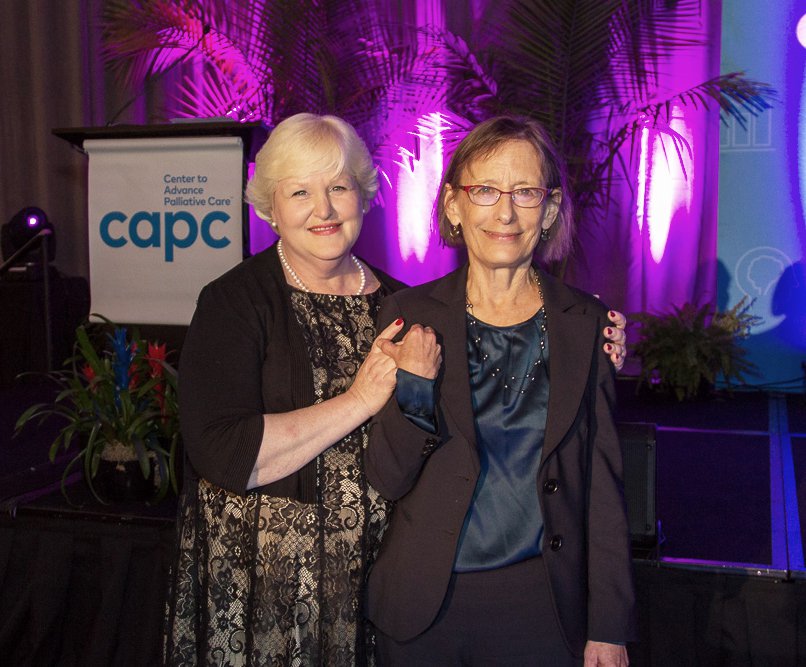Finding the Next Wave of Innovation

Where is the next wave of innovation coming from in palliative care? Programs across the country will tell us through CAPC's second John A. Hartford Foundation Tipping Point Challenge.
In this blog post, we hear from Diane E. Meier, MD, director of the Center to Advance Palliative Care, and Amy Berman, RN, LHD, FAAN, Senior Program Officer with The John A. Hartford Foundation. They discuss what the nation needs, what we are looking for, and how we are going to uncover innovation that can be put into action – to change the future of palliative care.
Why does the field need to innovate?
Diane E. Meier (DEM): Palliative care is still a relatively new service line in the United States, with huge diversity in models, staffing, capacity, and quality. We are all still learning about how to best deliver it, in a manner that matches the quality guidelines in the National Consensus Project for Quality Palliative Care, and is feasible from a financial and workforce standpoint. Innovators in the field have developed a range of urgently needed home-based palliative care models, bringing the capacity to meet needs beyond the four walls of the hospital, where it is largely unmet.
If our goal is to ensure that each person who needs palliative care gets it, innovation is essential. For instance, there has been incredible creativity and impact during the pandemic – necessity truly is the mother of invention. In this Challenge, we want to learn about your innovations: what you did, how you did it, and what you might do differently next time.
"If our goal is to ensure that each person who needs palliative care gets it, innovation is essential."
Amy Berman (AB): To quote Diane Meier throughout the years, “We need palliative care everywhere.” In order to get there, we need the best and brightest to share their innovations, so that others can scale and spread these exciting ideas.
DEM: Palliative care is not yet fully embedded into the genome of American medicine. There are still hospitals without, or with inadequate, palliative care teams. And there are many areas in our country without access to community or nursing home palliative care services. This has to change. Access to quality palliative care should be a fundamental and reliable aspect of the US health care system so that people living with serious illness can rely on us to identify, and relieve stress and suffering.
"Access to quality palliative care should be a fundamental and reliable aspect of the US health care system [...]"
AB: Change is desperately needed to move the field forward. People living with serious illness need access to high-quality care, and palliative care is an essential component of that.
Why are CAPC and The John A. Hartford Foundation focusing on three key areas of innovation?
In order to make a paradigm shift in the care of serious illness over the next decade, we need to address the most critical levers of change.
This is the focus of the second Tipping Point Challenge. We’ll let Diane and Amy explain each area, in more detail...
1) Building skills among non-palliative care specialties and disciplines treating CHF, COPD, and cancer
DEM: It is obvious that the number of people needing what palliative care has to offer – skilled communication about what to expect; expert control of symptoms like pain and anxiety; support for family and other caregivers – far exceeds the capacity of the specialist palliative care workforce. To meet these needs, we must train all front line clinicians in these essential skills. This is necessary because most medical and nursing schools in the United States do not teach these skills, leaving clinicians to figure it out for themselves, once they start taking care of patients. Programs across the nation recognize the need to train their clinicians in communication, and pain and symptom management when treating patients with serious illness. CAPC is interested in learning how this is being done, and what does and does not work, so that we can rapidly scale the most successful approaches.
"We need new ways to build the skills of nonpalliative care specialties and disciplines, in order to address our patients with serious illness."
AB: We know how important palliative care specialists are. Yet we know there aren’t enough specialists to match the needs of people living with serious illness. This is why this innovation Challenge is critical to the field. We need new ways to build the skills of nonpalliative care specialties and disciplines, in order to address our patients with serious illness – specifically CHF, COPD, and cancer. This holds true for the current pandemic and beyond. This need is also critical to the communities we serve, which may lack palliative care specialists. We need to address this disparity.
2) Improving systematic access to palliative care
DEM: We’ve all encountered patients who have spent weeks or months in the hospital, or ICU, with needless suffering and confusion, until a palliative care specialist was consulted to address patient and family distress, and help untangle a long and difficult hospitalization. This kind of delay and variation in access to high quality care during a serious illness is unjust. Why do only some people receive timely access to palliative care services, and others, with similar needs, never get it, or get it much too late? What can we do to ensure the same access for people of color, for patients in public and safety net systems, for underserved and high-risk groups? This kind of variation in access to evidence-based care is poor quality care.
"Why do only some people receive timely access to palliative care services, and others, with similar needs, never get it, or get it much too late?"
AB: It always shocks me that palliative care exists in most hospitals and a growing number of communities, yet people living with a serious illness are oftentimes not referred. This Challenge seeks bold ideas which address systemic issues that have stifled high quality care for this population.
3) Implementing a population health approach to identify and address patients with serious illness and unmet needs
DEM: Systematizing access to palliative care for all in need, and all who would benefit, requires a new approach – one that screens every patient and family for their needs, identifies those with unmet needs, and connects them in a consistent and standardized manner.
This can be done with the palliative care clinician on the team who is best able to help. For example, if the issue identified is lack of access to safe housing or transportation, the palliative care social worker is the right person. If the issue is poorly managed pain or difficulty breathing, the palliative care physician or nurse practitioner takes the lead. In this manner, the palliative care team can address a broad range of challenges, but can only do so if the patient has access to them. Right now, patients only receive palliative care if their attending physician thinks of reaching out. But, many do not and the patient pays the price. CAPC seeks innovative approaches to matching palliative care services to patients based on need, not luck.
"Systematizing access to palliative care for all in need, and all who would benefit, requires a new approach."
AB: We live in an age where new tools like artificial intelligence and algorithms can help us identify populations proactively, and match palliative care interventions with patient needs. This is your chance to share an innovation that identifies populations, and addresses their needs in a systematic way. Whether it is a project that you’ve been working on for a couple of years, or one that was developed in response to the pandemic, we are eager to see how your innovation will help reach patients in need.

What are CAPC and The John A. Hartford Foundation trying to change with the second Tipping Point Challenge?
DEM: In the second Tipping Point Challenge, CAPC and The John A. Hartford Foundation are trying to unearth and shine light on the wealth of novel and innovative strategies that our colleagues have developed and implemented. This way the rest of us can learn from and adopt them. Our field does not shy away from complex problems or patient needs. Through this Challenge, we want to harvest that determination and commitment, synthesize it into transferable skillsets, and get it out there for all to use.
"Our field does not shy away from complex problems or patient needs."
AB: The second John A. Hartford Foundation Tipping Point Challenge aims to improve the delivery and quality of care for people living with a serious illness, and their families, by building skills across specialties and disciplines, expanding access to palliative care, and reaching patients in need.
DEM: We look forward to seeing what our colleagues are working on to advance the field of palliative care. While all topics are welcome, COVID-19, health equity, and upstream palliative care initiatives fit within all three categories of innovation, as all of these issues have stretched our practice and minds.
If you are working on a project that has or will make positive, breakthrough change in the care of serious illness, CAPC wants to hear about it. Sign up for the Tipping Point Challenge through March 2021 – it will take just a few minutes. Project submissions will take place throughout April 2021.
Sign Up